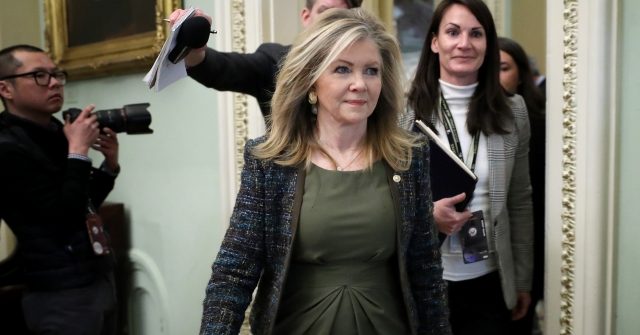Big-name congressmembers looking to bolster the future of the GOP spoke on a Republican State Leadership Committee (RSLC) panel Wednesday about pursuing down-ballot races, an area the GOP dominated in 2020 amid losses at the federal level.
Sens. Marco Rubio (R-FL), Marsha Blackburn (R-TN), and Tim Scott (R-SC) as well as Reps. Ashley Hinson (R-IA) and Young Kim (R-CA) — all of whom were once state lawmakers themselves — gave advice to an audience of Republican operatives, state-level candidates, and RSLC donors.
Tonight @RSLC is honored to welcome @marcorubio, @votetimscott, @votemarsha, @youngkimCA, and @hinsonashley to our panel: The Future of the GOP Starts in the States to discuss the importance of expanding the Republican Party. pic.twitter.com/6rLKGzwcHV
— Dee Duncan (@DeeDuncan14) October 20, 2021
The event was framed as boosting recruitment of women and minority candidates, but Rubio, the son of Cuban immigrants, quashed identity politics early on, stressing life experience was the most pertinent qualification in a candidate.
“What’s so unique about the American identity is it’s not a skin color,” Rubio said.
He continued, “We need people to run from diverse background who can bring diverse life experience that isn’t just about the color of your skin and ethnicity. It’s about everything you’ve gone through up to this point and everything you’ve grown up with,” adding that unlike China, where politicians are “chosen very young, in certain families,” politicians in the U.S. are intended to be “truly representative” of the everyday American.
Blackburn, who has worked in Tennessee politics for more than three decades, emphasized the need for candidates to relate to constituents, saying Republicans have a propensity to be good on the “technical” side but not on the “emotional” side. “People don’t like ‘I , I, I.’ They like for you to talk with them — not at them, not to them — but to talk with them about what they’re facing every single day,” she said.
When asked by former Puerto Rico Gov. Luis Fortuño (R), the panel moderator, about how to communicate policies so they resonate with minority voters, Scott highlighted education policy, saying, “the closest thing to magic in America is a good education” and that Republicans “should champion on every single level of government” a “quality education in the poorest, most marginalized zip codes in this nation.” Scott also directed the GOP to “protect the goose that lays the golden eggs,” specifying that the “goose” is a free enterprise system, not the government.
Rubio in response to the question blasted those who push that America is an “evil, systemically racist country” and those seeking to “codify socialism by injecting the federal government in every aspect of our lives. There’s no way you’re ever going to root that out. These programs, once in place, are very difficult to remove.”
Blackburn said that relating to women voters can be done by recognizing that “the security moms” are “back in force.”
“They are furious about mandates and lockdowns. They think the money should follow the child because it is taxpayer money. It’s not government money. And they are really angry about CRT [Critical Race Theory],” Blackburn said, adding that there exists “a lot of mama bears, papa bears, grandmama bears that are ready to go fight” President Joe Biden’s Department of Justice after its recent move to mobilize the FBI against outraged parents of schoolchildren.
Hinson, a freshman congresswoman and mother of two boys, also zoned in on relating to the average American. “I go grocery shopping. I understand. I am a per-ounce grocery shopper,” she explained. “When you’re feeding a family and you have a budget — the federal government could learn a thing or two from how moms do their grocery shopping. … It’s about framing up that conversation, because it does affect families like mine. It affects families like yours.”
Kim, who was born in South Korea, suggested candidates should highlight that “opportunity” comes with the cost of “hard work,” using one of her key issues, affirmative action, as an example. Proponents of affirmative action, like Ivy League schools, have “interesting admission standards,” Kim said, where they “penalize hardworking students. Asian Americans, those from different communities, they have to work extra hard to get into colleges. It’s not based on merit.”
The panelists speaking Wednesday are members of the RSLC’s Right Leaders Network advisory council, which will focus on the RSLC’s recruitment efforts.
The RSLC noted in a press release about its Right Leaders Network initiative that “building the party must start in the states,” noting that 21 of the 50 Republican U.S. senators previously served in state office, as well as 104 Republican House members and 10 Republican governors.
Write to Ashley Oliver at [email protected].



